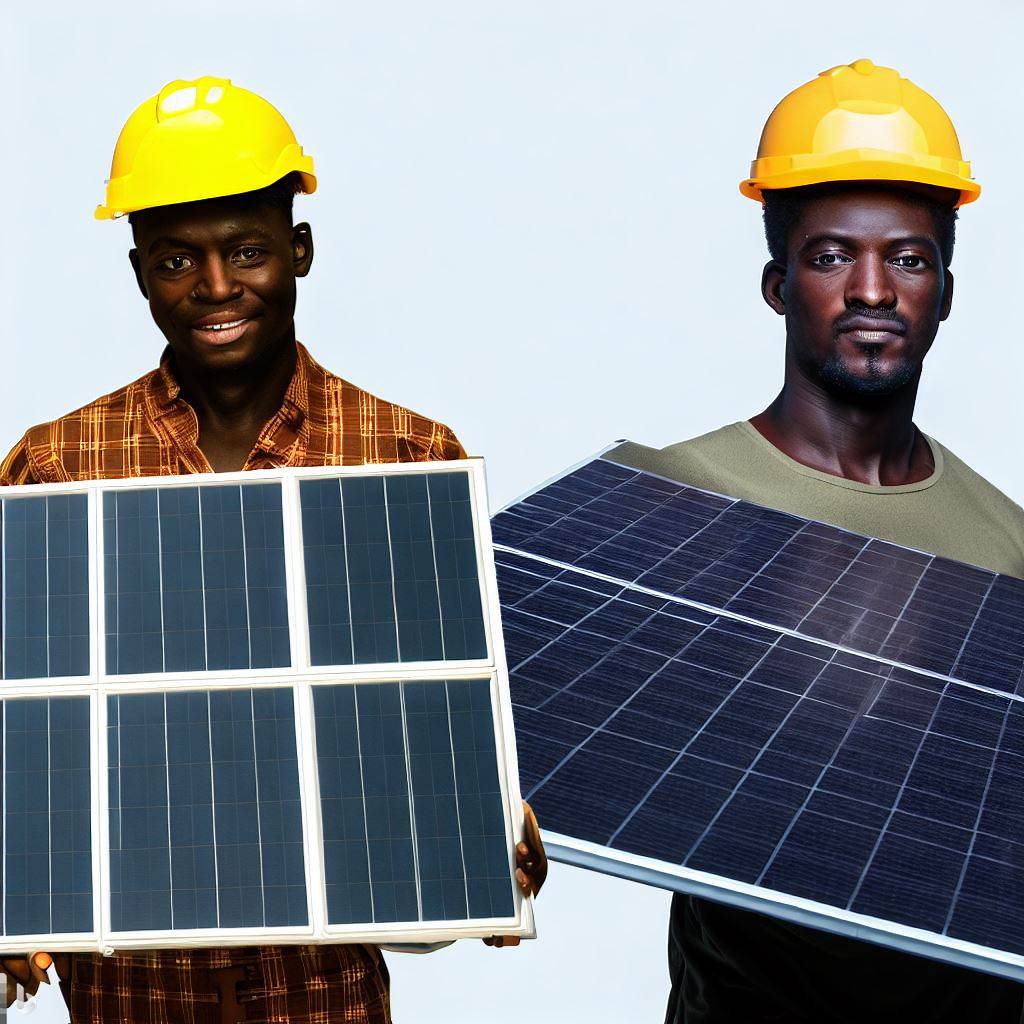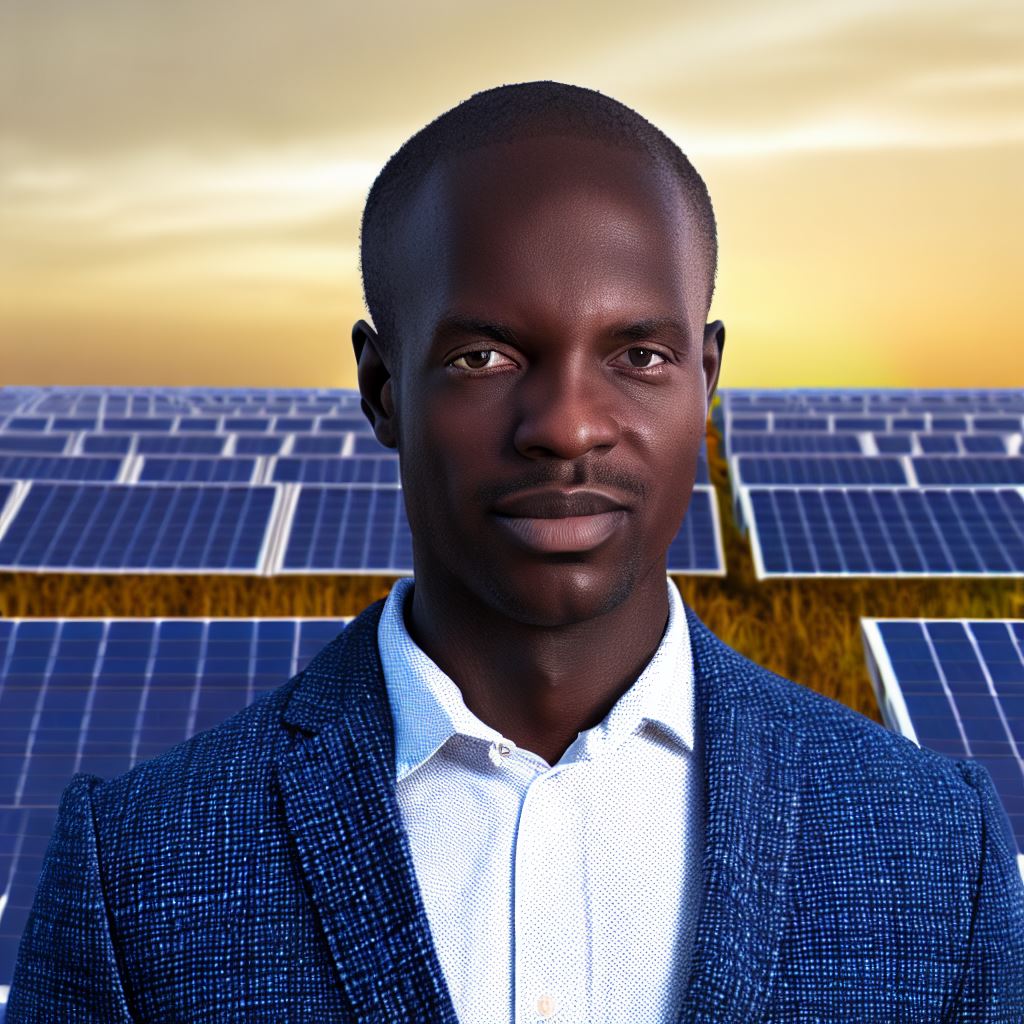Introduction
Let’s talk about impact of solar PV installation on economy.
Solar PV installation is crucial for Nigeria, which heavily relies on fossil fuels, causing environmental and economic challenges.
Thesis statement: Solar PV installation can significantly impact Nigeria’s economy.
Recent years witnessed a surge in solar PV system installation in Nigeria.
The nation, rich in natural resources, predominantly depends on fossil fuels. However, this reliance has adverse environmental and economic consequences.
Nigeria’s energy sector is oil-dominated, contributing significantly to the GDP.
Yet, it’s susceptible to global oil price fluctuations, geopolitical tensions, and environmental issues.
Diversifying the energy mix and reducing fossil fuel dependence is pressing.
Solar PV installation provides a solution, unlocking economic growth potential. Solar energy, clean and reliable, reduces greenhouse gas emissions and environmental harm.
This transition fosters job creation, attracts foreign investments, and bolsters energy security.
This section delves into the economic impacts of solar PV installation in Nigeria:
- Job Creation: Solar projects create employment opportunities, benefiting local communities.
- Cost Savings: Solar energy reduces electricity costs for households and businesses, enhancing affordability.
- Technological Advancements: Solar PV fosters innovation, positioning Nigeria as a leader in renewable technology.
- Increased Access: Solar installations expand electricity access, driving economic activities in underserved areas.
By analyzing these factors, we gain insights into how solar PV installation can revolutionize Nigeria’s economy and promote sustainability.
In subsequent sections, we’ll explore specific economic impacts, highlighting potential benefits and challenges associated with this renewable energy transition.
Benefits of Solar PV Installation
Reduce dependence on fossil fuels and promote renewable energy sources
- Decrease carbon emissions and mitigate climate change effects.
- Improve air quality and public health.
Create job opportunities and stimulate economic growth
- Establish a solar energy industry, manufacturing, and installation sector.
- Boost local entrepreneurship and innovation.
Enhance energy security and affordability
- Reduce reliance on imported fossil fuels.
- Lower electricity costs for households and businesses.
Foster sustainable development and poverty alleviation
- Solar PV installation provides rural and underserved communities with electricity access.
- Decentralized energy production empowers local communities.
- Reducing reliance on fossil fuels contributes to climate change mitigation.
- Lower greenhouse gas emissions enhance environmental sustainability.
- Improved air quality benefits public health by reducing respiratory and cardiovascular diseases.
- Job creation in solar energy manufacturing and installation stimulates economic growth.
- Entrepreneurship and innovation thrive in the renewable energy sector.
- Local and foreign investments in the solar industry further drive economic development.
- Energy security and affordability improve as dependence on imported fossil fuels decreases.
- Stable and reliable energy supply reduces vulnerability to global oil market fluctuations.
- Lower electricity costs make energy more affordable for households and businesses.
- Providing electricity access in rural areas improves education, healthcare, and digital services.
- Decentralized energy production empowers communities and supports income-generating activities.
- Solar PV systems contribute to poverty reduction by fostering sustainable development.
- Embracing solar PV installation leads Nigeria toward a cleaner, more sustainable, and inclusive future.
Read: Cleaning Supplies: What Every Nigerian Janitor Needs
Challenges and Barriers to Solar PV Implementation in Nigeria
Insufficient policy and regulatory frameworks
- Lack of supportive legal and institutional frameworks.
- Inconsistent government policies and regulations.
Limited access to finance and investment
- High upfront costs and financing challenges.
- Limited availability of funding and investment mechanisms.
Technical and infrastructure limitations
- Inadequate grid infrastructure and transmission systems.
- Limited skilled workforce and training programs.
Social and cultural barriers
Challenges hinder solar PV adoption in Nigeria:
- Insufficient policy and regulatory frameworks create uncertainty and discourage investments.
- Limited access to finance deters investors due to high upfront costs and funding scarcity.
- Technical limitations like inadequate grid infrastructure and a shortage of skilled labor hinder progress.
- Social and cultural barriers arise from a lack of public awareness and skepticism.
To address these challenges:
- Develop supportive policies and regulations to foster investment and implementation.
- Improve access to finance by establishing funding mechanisms and exploring innovative options.
- Invest in grid infrastructure and expand capacity to accommodate solar PV installations.
- Promote skill development and training programs to create a qualified workforce.
- Conduct public awareness campaigns to educate the population about solar PV benefits.
- Engage with communities to enhance social acceptability and foster a positive attitude toward renewable energy.
By tackling these hurdles, Nigeria can unlock the economic potential of solar PV, promoting sustainable development and energy security.
Read: Top Janitorial Companies in Nigeria: An Overview

Government Initiatives and Support for Solar PV
Renewable energy policies and targets
- Key government policies and targets promoting solar PV
- Major initiatives for renewable energy market transformation
Financial incentives and subsidies
- Financial incentives such as tax exemptions and duty waivers
- Government subsidies for solar PV installation and equipment
Public-private partnerships and international collaborations
- Collaborations between government agencies and private companies
- Partnerships with international organizations and development agencies
The Nigerian government has recognized the immense potential of solar PV installation in boosting the economy and achieving sustainable development.
To support this, they have implemented various initiatives and policies to promote renewable energy, particularly solar PV.
Renewable energy policies and targets
Key government policies and targets promoting solar PV
The government of Nigeria has formulated and implemented several policies and targets to encourage the adoption of solar PV.
These policies include the National Renewable Energy and Energy Efficiency Policy (NREEEP) and the Renewable Energy Master Plan (REMP).
These policies aim to increase the share of renewable energy in the country’s energy mix and promote the use of solar PV in both urban and rural areas.
Major initiatives for renewable energy market transformation
In addition to policies, the Nigerian government has undertaken several initiatives to transform the renewable energy market.
One notable initiative is the Scaling Solar Program, supported by the World Bank.
This program provides technical and financial assistance to developers, reduces project development risks, and accelerates the deployment of solar PV projects in Nigeria.
It streamlines the process of project procurement and ensures transparency and efficiency.
Financial incentives and subsidies
Financial incentives such as tax exemptions and duty waivers
The government offers financial incentives to attract investments in solar PV installation.
These incentives include tax exemptions on imports of solar PV components, duty waivers on renewable energy equipment, and reduced import duties on solar panels.
These measures aim to reduce the financial burden on investors and make solar PV installation more economically viable.
Government subsidies for solar PV installation and equipment
To promote the widespread adoption of solar PV, the Nigerian government provides subsidies for solar PV installation and equipment.
These subsidies help reduce the upfront costs associated with installing solar PV systems, making them more affordable for households, businesses, and communities.
This has led to an increase in the number of solar PV installations throughout the country.
Public-private partnerships and international collaborations
Collaborations between government agencies and private companies
The Nigerian government has established partnerships with private companies to facilitate the implementation of solar PV projects.
These collaborations involve joint ventures, public-private partnerships (PPPs), and other forms of cooperation.
By leveraging the expertise and resources of private companies, the government aims to accelerate the deployment of solar PV and drive economic growth.
Partnerships with international organizations and development agencies
Therefore, Nigeria has collaborated with international organizations and development agencies to strengthen its solar PV sector.
Partnerships with entities like the International Finance Corporation (IFC) and the United Nations Development Program (UNDP) have provided financial and technical support for the development of solar PV projects.
These collaborations help attract foreign investment, transfer technology, and build local capacity in the solar PV industry.
In essence, the Nigerian government has prioritized the promotion of solar PV installation as a means to boost the economy and achieve sustainable development.
Through renewable energy policies, financial incentives, and public-private partnerships, they are creating an enabling environment for the growth of the solar PV sector.
These government initiatives and support are instrumental in driving the adoption of solar PV, creating jobs, and reducing the country’s carbon footprint.
Read: Challenges and Rewards of Janitor Work in Nigeria
Case Studies and Success Stories
Examples of Successful Solar PV Installations in Nigeria
- Mention specific projects that made a significant impact on local communities and businesses.
- Highlight innovative approaches and replicable models.
Testimonials from Individuals or Businesses that Have Benefited from Solar PV
- Discuss how solar PV installations have improved their energy access and reduced costs.
- Emphasize the social and economic transformations experienced by individuals and communities.
Case studies and success stories from Nigeria demonstrate the positive impact of solar PV installations on the economy.
Examples of Successful Solar PV Installations in Nigeria
- In Kankara, Katsina State, the installation of a solar PV power plant provided electricity to over 2,000 households and businesses.
This project significantly improved the quality of life in the community. - The solar PV street lighting project in Abuja has not only enhanced safety and security but also led to significant energy savings for the city.
This project has become a replicable model for other urban areas in Nigeria.
Testimonials from individuals or businesses that have benefited from solar PV
- Mr. Adeolu, a small business owner in Lagos, shared his experience of installing solar PV panels.
He highlighted how it has reduced his electricity bills by 80% and allowed him to invest the savings in expanding his business. - Mrs. Amina, a resident of a rural community in Ogun State, expressed gratitude for the solar PV mini-grid that now powers her home.
She explained how access to reliable electricity has improved the education of her children and allowed her to start a small business, creating economic opportunities for her and her community.
Solar PV installations have not only increased energy access but also brought about social and economic transformations.
Communities that lacked electricity now have improved access to education, communication, and healthcare services.
Additionally, businesses have benefited from reduced operating costs, enabling them to invest in expansion and job creation.
This has stimulated local economies and contributed to the overall economic growth of Nigeria.
The success of these solar PV installations lies in the innovative approaches and replicable models implemented.
By leveraging solar resources and utilizing efficient technologies, Nigeria has achieved sustainable and clean energy solutions.
These case studies and testimonials serve as inspiration for further solar PV installations in Nigeria.
They demonstrate the potential for widespread economic development and improved living conditions through renewable energy adoption.
As the Nigerian government continues to prioritize renewable energy, it is expected that more success stories will emerge.
The positive impact of solar PV installations on communities, businesses, and the economy will continue to be a driving force for sustainable growth in Nigeria.
Read: A Day in the Life of a Nigerian Janitor: An Insight
Conclusion
- In general, this blog post has discussed the impact of solar PV installation on Nigeria’s economy.
- It has reiterated the potential of solar PV installation to positively impact Nigeria’s economy.
- It is crucial for there to be increased governmental support, private sector involvement, and public awareness.
- “What steps can you take to promote the adoption of solar PV systems in your community?” We look forward to your feedback!




